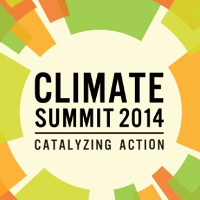26 September 2014
IIASA at the Climate Summit 2014
Over 100 Heads of State and Government along with 800 leaders from business, finance and civil society attended the United Nation Secretary-General’s Climate Summit 2014. The purpose was to raise political momentum for a meaningful universal climate agreement in Paris in 2015 and to galvanize transformative action in all countries to reduce emissions and build resilience to the adverse impacts of climate change (see Chair’s summary of the summit (pdf)).
IIASA Director General and CEO Professor Dr Pavel Kabat through his membership of the Leadership Council of the SDSN, led by Jeffrey Sachs, a special advisor to UN Secretary General and IIASA Distinguished Visiting Fellow, discussed with world leaders and eminent experts from the Leadership Council how to make the long-term transformations to sustainable development in a series of meetings running up to the Climate Summit. Among these events, Kabat took part in a luncheon for mayors, organized by Sachs, to discuss current and future initiatives to make cities as sustainable and climate-friendly as possible. Discussions took place with the Mayors of Buenos Aires, Bogota, Copenhagen, Melbourne, New York and Paris.
In addition, the SDSN through its Deep Decarbonization Pathway Project, to which IIASA also contributes, played an important role in this summit. IIASA Deputy Director Professor Nebojsa Nakicenovic also took part in the SDSN meetings at which a new project—The World in 2050—was outlined. This project will explore the necessary transformative pathways for key sectors to meet economic development goals within a safe operating space of a stable planet.
“Listening to the Heads of State in the General Assembly Hall, I was particular struck by how many IIASA initiatives were linked to countries’ action plans,” said Kabat. “For example, the United States has played a key role in new initiatives from the Climate and Clean Air Coalition (CCAC) on reducing black carbon and methane emissions from agriculture and the oil and gas industry. IIASA’s work was key in establishing CCAC.”
At the UN on 23 September Nakicenovic gave the opening speech at the SE4ALL policy session on how much energy efficiency can contribute to a sustainable energy future. Nakicenovic and two IIASA researchers were key authors on a new report on climate solutions commissioned by the Alliance of Small Island States, which are poised to suffer early and greater climate impacts. The report was launched by the President of the Republic of Nauru at the Climate Summit. Nakicenovic is also co-Chair of the Global Carbon Project which, a day before the summit, released its 2014 Carbon Budget showing the continuing rise of global greenhouse gas emissions in 2013. And Nakicenovic is also a member of the German Advisory Council on Global Change (WBGU), which released a new report entitled “Climate Protection as a World Citizen Movement” in New York on 23 September by the German Foreign Minister.
The United States President addresses the UN Climate Summit 2014. New actions announced by the US to combat global climate change have much in common with IIASA’s research. For example, the US will work closely with business and the Government of Indonesia on sustainability in the Indonesian palm oil industry—something that IIASA is researching in its Tropical Flagship Initiative.
Photo credit: UN Photo/Cia Pak
The UN Climate Summit Opening Film: Presented to world leaders at the United Nations Climate Summit in New York, this short inspirational film shows that climate change is solvable. We have the technology to harness nature sustainably for a clean, prosperous energy future, but only if we act now. Narrated by Morgan Freeman, it calls on the people of the world to insist leaders get on the path of a livable climate and future for humankind.
Many members of the Alpbach-Laxenburg Group—a reflection group striving to create new narratives for sustainable development also made important contributions to the Climate Summit. These included: Peter Bakker, Tarja Halonen, Rajendra K. Pachauri, Robbert Dijkgraaf, Mary Robinson, and Jeffrey Sachs.

IIASA announcements at the climate summit



